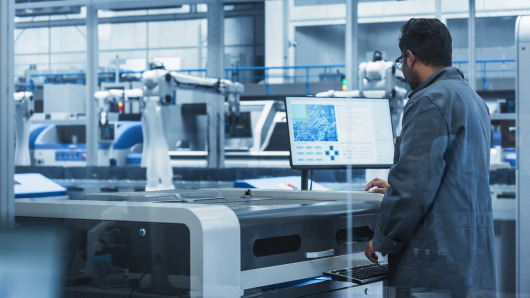
How to Hire an Automation Engineer

The demand for automation engineers has soared. Many companies across different industries are actively looking for qualified professionals to design and operate automated systems, improving efficiency and fostering innovation.
The main issue is that automation engineering has advanced beyond simple robot programming. Modern automation engineers need to manage complex systems that incorporate AI, machine learning, IoT, and data analytics. Finding suitable candidates requires understanding what makes an exceptional automation engineer.
What Does an Automation Engineer Actually Do?
The designers of efficiency work as automation engineers. The process of automation engineering involves designing and programming automated systems, then testing them through simulation to enable autonomous performance of specific tasks.
These professionals work in different sectors, including manufacturing, food processing, transportation, and energy production. The automation engineer is responsible for all phases of an automation project, from conceptualization through development, implementation, and ongoing maintenance.
The scope goes beyond what most people realize. Modern automation engineers do more than just program machines. They handle system integration, work with hardware equipment, develop documentation, train personnel, and ensure compliance with regulations. They also perform system maintenance by resolving operational issues and performing scheduled updates.
Essential Skills Every Automation Engineer Needs
Technical Skills That Matter
Programming Languages: Python, Java, C++, and C# are fundamental. But don’t stop there. Automation engineers also need proficiency in JavaScript for web-based automation tools.
Automation Tools and Frameworks: Look for experience with Selenium, Jenkins, Puppet, Chef, and modern RPA platforms like UiPath or Blue Prism. These tools are the backbone of automated processes.
Control Systems Knowledge: Understanding PLC programming, SCADA systems, and robotics is crucial. Candidates should demonstrate hands-on experience with these technologies.
Cloud Computing: AWS, Azure, and Google Cloud are no longer optional. Cloud integration is now essential for deploying automation solutions.
Soft Skills That Make the Difference
The ability to solve problems effectively is the most important skill. Automation engineers must identify complex system issues and develop innovative solutions quickly.
The ability to communicate effectively is equally important. Professionals need to present technical information to non-technical stakeholders while maintaining effective collaboration with teams from different functions.
Don’t overlook adaptability. The automation industry undergoes rapid changes, so successful engineers must learn new technologies and adapt to evolving project requirements.
Where to Find Automation Engineer Candidates
Traditional and Modern Sourcing Strategies
University Programs: Target graduates from electrical engineering, mechanical engineering, computer science, and dedicated automation engineering programs. Many universities now offer specialized tracks in automation.
Professional Networks: LinkedIn remains influential, but consider exploring specialized platforms like Stack Overflow, GitHub, and automation-focused forums where these professionals congregate.
Industry Events: Automation conferences, robotics exhibitions, and Industry 4.0 summits attract talented professionals looking for new opportunities.
Employee Referrals: Your current engineering team probably knows other talented automation experts. Establish a strong referral program.
The Passive Candidate Challenge
Most experienced automation engineers do not actively look for new jobs. These engineers focus on solving complex problems for their current companies. Your sourcing strategy needs to be both proactive and compelling, as experienced automation engineers are not actively seeking new opportunities.
Build relationships before you need them. Your company should participate in automation communities and contribute to technical discussions to establish its position as the preferred automation employer.
Crafting the Perfect Job Description
The job description should specify that candidates have experience with specific technologies and automation frameworks.
The role description should highlight its direct influence on business objectives. The statement “Design automation systems that reduce manufacturing costs by 30%” is more compelling than “Implement automation solutions.”
The job description should include details about professional development paths, as well as training initiatives and access to innovative technologies.
The salary range for automation engineers spans between $80,000 and $150,000, but this amount changes based on location and work experience.
Interview Strategies That Work
Technical Assessment Best Practices
Practical Coding Tests: Present candidates with real-world automation challenges they may encounter in the role. Ask them to write a script that automates a specific workflow or troubleshoots a system issue.
System Design Questions: Present a business process and ask how they’d approach automating it. This reveals their analytical thinking and system architecture skills.
Tool Proficiency: Test their hands-on experience with your specific automation tools rather than just asking about them.
Behavioral Interview Questions
- “Describe a time when an automation project failed. What did you learn?”
- “How do you prioritize multiple automation projects with competing deadlines?”
- “Tell me about a complex system integration you’ve managed.”
Red Flags to Watch For
Candidates who can’t explain their technical decisions in simple terms. Automation engineers must communicate with diverse stakeholders.
Reluctance to discuss failures or challenges. The best engineers learn from setbacks and use them to improve.
Narrow focus on just one area of automation. Modern roles require versatility across multiple technologies and domains.
Salary Expectations and Market Trends
The automation engineering market is competitive. Industry data show that professionals with 3-5 years of experience earn higher salaries due to their advanced technical skills and project management capabilities.
The starting salaries for entry-level positions range from $65,000 to $80,000, while senior roles pay over $150,000. Salary ranges vary depending on location, as tech hubs typically offer higher pay.
Don’t forget about total compensation. The base salary is not the only thing that automation engineers value; they also prioritize professional development opportunities, flexible work arrangements, and access to cutting-edge technologies.
Common Hiring Challenges and Solutions
The Skills Gap Reality
Finding candidates with the exact technology stack you need can be challenging. Consider hiring for core competencies and providing training on specific tools and technologies.
Competition for Top Talent
The best automation engineers often have multiple offers. Speed up your hiring process without sacrificing quality. Set clear expectations about the timeline and next steps.
Evaluating Cultural Fit
Automation engineers often work independently but must collaborate effectively. Assess their ability to work in your specific environment and team structure to achieve their goals.
Making the Right Choice
The field of automation engineering continues to evolve rapidly. The best candidates possess strong technical skills, a keen interest in emerging technologies, and a commitment to ongoing learning.
The ideal candidates possess both technical skills and a business understanding when it comes to implementing automation. The best candidates demonstrate how their work enhances operational efficiency, reduces costs, and generates competitive advantages.
Evaluate candidates’ capacity for professional growth over time. A candidate showing potential for advancement in your automation projects and future leadership offers more value than someone who is technically skilled but lacks growth potential.
Ready to Build Your Automation Dream Team?
The process of choosing the right automation engineer requires both expert knowledge and ample time, along with trustworthy access to qualified candidates. Your hiring partner must understand both the technical requirements and the human factors that contribute to a successful hire.
Our engineering staffing experts at Hunter Recruiting help businesses find top automation engineering talent. Our team has extensive knowledge of this rapidly evolving field, allowing us to identify candidates who will elevate your automation initiatives.
Our team will work with you to develop a targeted approach that attracts top candidates and builds the technical staff your organization needs for success. Contact us to get started!












